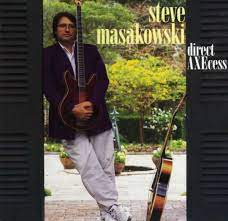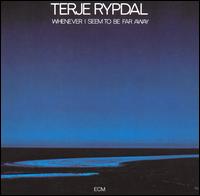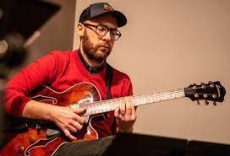
Daily Dose Of Jazz…
Steve Masakowski was born on September 2, 1954 in New Orleans, Louisiana and The Beatles influenced his desire to play guitar. When he was fourteen, he played bass guitar and co-founded the band Truth, which was based on the rock band Cream. During his high school years he became interested in composing, and started taking guitar lessons to learn about harmony. His teacher introduced him to the music of jazz guitarists Joe Pass, Wes Montgomery, Pat Martino, and Lenny Breau.
He went to Berklee College of Music in 1974, studied music theory, arranging, and composition. Returning home with his girlfriend Emily Remler after getting his degree, Steve founded the group Fourplay, not to be confused with the later jazz group of the same name. From 1976 to 1978, he studied classical composition and orchestration at the New Orleans Center for Creative Arts with Bert Braud.
The early Eighties he played regularly with local New Orleans musicians such as Willie Tee, Earl Turbinton, Jr. and Alvin Tyler, as well as accompanying visiting musicians Randy Brecker, Tom Harrell, Art Baron, and Dave Liebman. His next band Mars played a mix of jazz and electronic music. He then went on to found the Composers Recording Studio with harpist Patrice Fisher, guitarist Jimmy Robinson, and violinist Denise Villere. After a ten year stretch the studio closed and he started working in duet with Ellis Marsalis Jr., then joined Astral Project, toured with Dianne Reeves. He leads the band Nova NOLA.
As an educator in 1991, he became a full-time faculty member at the University of New Orleans and became Chair of Jazz Studies and director of the jazz program in 2004 . He invented the key-tar, a guitar-like instrument with seven rows of keys instead of strings, one key at each fret. This pre-MIDI controller was hardwired to a Moog synthesizer.
Inspired by a visit to New Orleans by seven-string guitarist Bucky Pizzarelli, he began to explore the seven-string guitar, first finding an early Gretsch, then designing his own models which have the expanded range of a normal guitar and bass guitar combined. Guitarist and educator Steve Masakowski continues to perform, record and educate.
More Posts: bandleader,guitar,history,instrumental,jazz,music

The Jazz Voyager
From the West Coast to middle America the jazz Voyager is off to Ann Arbor, Michigan to seize the opportunity to witness the ambience of Blue Llama, a jazz club where it is said they present live jazz and world music paired with New Orleans-inspired cuisine. A destination music venue and restaurant located at 314 S. Main Street 48104, this week they are offering up for our musical pleasure the guitar talents of Randy Napoleon.
The jazz guitarist, composer, and arranger has toured both nationally and internationally leading his own groups as well as with the Freddy Cole Quartet, pianist Benny Green, the Clayton-Hamilton Jazz Orchestra led by John Clayton, Jeff Clayton, and Jeff Hamilton, Rene Marie, and Michael Bublé.
He is an associate professor in the College of Music at Michigan State University[5] and has done master classes at universities and music schools throughout the United States, Canada and Japan.
More information can be had by calling 734-372-3200 or go to bluellamaclub.com.
More Posts: adventure,club,genius,guitar,jazz,music,preserving,travel

Daily Dose Of Jazz…
Terje Rypdal was born on August 23, 1947 in Oslo, Norway, the son of a composer and orchestra leader. He studied classical piano and trumpet as a child, and then taught himself to play guitar as he entered his teens.
Starting out as a Hank Marvin-influenced rock guitarist with The Vanguards, Rypdal turned towards jazz in 1968. He joined Jan Garbarek’s group and then George Russell’s sextet and orchestra. An important step towards international attention was his participation in the 1969 free jazz festival in Baden-Baden, Germany, where he was part of a band led by Lester Bowie. During his musical studies at Oslo University and conservatory, he led the orchestra of the Norwegian version of the musical Hair.
He has recorded on the ECM record label, both jazz-oriented material and classical compositions. His compositions Last Nite and Mystery Man were featured in the Michael Mann film Heat, and included on the soundtrack. Terje has performed in concerts with guitarists Ronni Le Tekrø and Mads Eriksen as N3.
Guitarist and composer Terje Rypdal, an important member in the Norwegian jazz community, continues to compose, perform and record.
More Posts: bandleader,guitar,history,instrumental,jazz,music

PAT METHENY
Dream Box Tour | Kaufmann Concert Hall
Guitar god Pat Metheny – one of the most revered and influential artists in jazz and beyond – joins us for an exclusive NYC appearance on his new Dream Box solo tour.
An unprecedented performance setting for the 20-time Grammy Award winner, the concert features personal and fan favorites from Metheny’s remarkable nearly 50-year career, with an emphasis on the “quiet electric guitar” aspects of his artistry in music Downbeat has hailed for its “unadorned, heartfelt beauty.”
Metheny says, “[This] is something different for me – focused on the various ways of playing solo I have explored across all these decades, in an evening that I think will be very special.” Performing on 12 guitars from his ever-growing collection, this is a rare chance to hear the most personal side of this trailblazing artist.
More Posts: adventure,club,genius,guitar,jazz,music,preserving,travel

JEAN CHAUMONT
French jazz guitarist and composer who started playing guitar at fourteen years old, after eight years of piano training. Two years later, he began formally studying jazz music. He received a degree in jazz musical studies from the Conservatory of Orsay in 2004, later rounding out this academic training by playing extensively in France with musicians such as Fiona Monbet, Ibrahim Maalouf, Armel Dupas, and Karl Jannuska in venues such as Festival Jazz à Saint-Germain-des-Prés, Charlie Jazz Festival, Salle Pleyel, and Sunset/Sunside. Alongside his performance work, Chaumont was commissioned for various compositions and arrangements including the scoring of “Le Bonheur en Suspens,” a full-length French documentary for France 3.
Chaumont moved to Princeton, New Jersey in 2014. He began composing for his debut album, The Beauty of Differences, which was released on 15 June 2018. It received critical acclaim including a four-star review from Down Beat magazine and remained in the top 100 in jazz radio airplay for ten weeks in the United States, according to JazzWeek. The Beauty of Differences features a core band with bassist Ike Sturm, saxophonist Sam Sadigursky, pianist Michael Bond, and drummer Rudy Royston as well as Tierney Sutton, Vinod Gnanaraj, John Hadfield, and Enoch Smith Jr. as guests. Its proceeds will finance the excavation of wells in the Sakata region of Malawi, Africa through the Villages in Partnership organization.
Admission: $5.00 Donation ~ Cash Only | 25 and Younger: Free | Youth Arrive At 6:00pm For A Free Dinner
More Posts: adventure,club,genius,guitar,jazz,music,preserving,restaurant,travel



